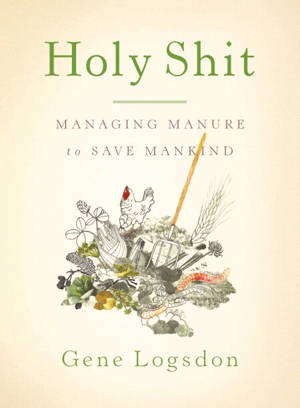
- Retrait gratuit dans votre magasin Club
- 7.000.000 titres dans notre catalogue
- Payer en toute sécurité
- Toujours un magasin près de chez vous
- Retrait gratuit dans votre magasin Club
- 7.000.0000 titres dans notre catalogue
- Payer en toute sécurité
- Toujours un magasin près de chez vous
17,26 €
+ 17 points
Format
Description
In his insightful book, Holy Shit: Managing Manure to Save Mankind, contrary farmer Gene Logsdon provides the inside story of manure — our greatest, yet most misunderstood, natural resource.
He begins by lamenting a modern society that not only throws away both animal and human manure, worth billions of dollars in fertilizer value, but that spends a staggering amount of money to do so. This wastefulness makes even less sense as the supply of mined or chemically synthesized fertilizers dwindles and their cost skyrockets. In fact, he argues, if we do not learn how to turn our manures into fertilizer to keep food production in line with the increasing population, our civilization, like so many that went before it, will inevitably decline.
With his trademark humor, years of experience writing about both farming and waste management, and uncanny eye for the small but important details, Logsdon artfully describes how to manage farm manure, pet manure and human manure to make fertilizer and humus. He covers the field, so to speak, discussing topics like:
How to select the right pitchfork for the job and use it correctly How to operate a small manure spreader How to build a barn manure pack with farm animal manure How to compost cat and dog waste How to recycle toilet water for irrigation purposes, and How to get rid ourselves of our irrational paranoia about feces and urine.
Gene Logsdon does not mince words. This fresh, fascinating and entertaining look at an earthy, but absolutely crucial subject, is a small gem destined to become a classic of our agricultural literature.
"Gene Logsdon, in his naughty and inimical style, has captured the essence of soil building, pathogen control, food ecology, and farm economics by explaining the elegantly simple symbiosis between manure and carbon. What a great addition to the eco-food and farming movement. . . Read and heed."—Joel Salatin, Author of You Can Farm and The Sheer Ecstasy of Being a Lunatic Farmer
He begins by lamenting a modern society that not only throws away both animal and human manure, worth billions of dollars in fertilizer value, but that spends a staggering amount of money to do so. This wastefulness makes even less sense as the supply of mined or chemically synthesized fertilizers dwindles and their cost skyrockets. In fact, he argues, if we do not learn how to turn our manures into fertilizer to keep food production in line with the increasing population, our civilization, like so many that went before it, will inevitably decline.
With his trademark humor, years of experience writing about both farming and waste management, and uncanny eye for the small but important details, Logsdon artfully describes how to manage farm manure, pet manure and human manure to make fertilizer and humus. He covers the field, so to speak, discussing topics like:
How to select the right pitchfork for the job and use it correctly How to operate a small manure spreader How to build a barn manure pack with farm animal manure How to compost cat and dog waste How to recycle toilet water for irrigation purposes, and How to get rid ourselves of our irrational paranoia about feces and urine.
Gene Logsdon does not mince words. This fresh, fascinating and entertaining look at an earthy, but absolutely crucial subject, is a small gem destined to become a classic of our agricultural literature.
"Gene Logsdon, in his naughty and inimical style, has captured the essence of soil building, pathogen control, food ecology, and farm economics by explaining the elegantly simple symbiosis between manure and carbon. What a great addition to the eco-food and farming movement. . . Read and heed."—Joel Salatin, Author of You Can Farm and The Sheer Ecstasy of Being a Lunatic Farmer
Spécifications
Parties prenantes
- Auteur(s) :
- Editeur:
Contenu
- Nombre de pages :
- 272
- Langue:
- Anglais
Caractéristiques
- EAN:
- 9781603583107
- Date de parution :
- 29-08-10
- Format:
- Ebook
- Protection digitale:
- Adobe DRM
- Format numérique:
- ePub

Les avis
Nous publions uniquement les avis qui respectent les conditions requises. Consultez nos conditions pour les avis.






